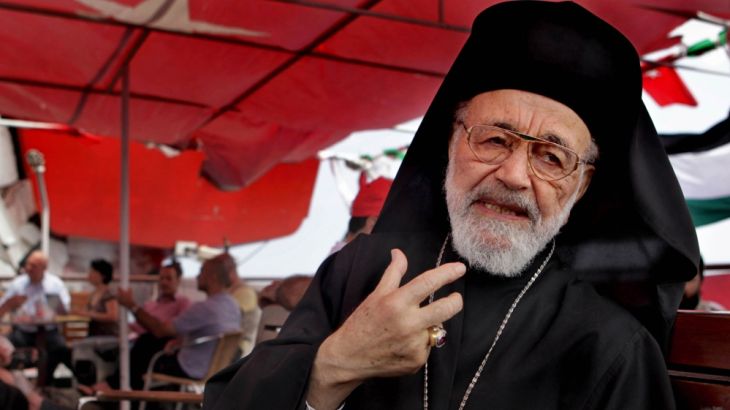
The Archbishop and the PLO
The story of Hilarion Capucci, the freedom-fighting Archbishop in Jerusalem who stood up for the Palestinian cause.
Filmmaker: Muhammad Salamah
Known to some as the “Father of the Palestinians” or “Archbishop of the Arabs”, Monsignor Hilarion Capucci was an enigmatic freedom-fighting Christian Archbishop in Jerusalem who was jailed for smuggling arms for the Palestine Liberation Organization (PLO) in the 1970s, but continued battling for the Palestinians until his death.
Keep reading
list of 4 items‘No turning back’: Carnation Revolution divides Portugal again, 50 years on
Photos: Romania ex-prisoners fight to save memory of former communist jails
Rwanda genocide: ‘Frozen faces still haunt’ photojournalist, 30 years on
Born in the Syrian city of Aleppo in 1922, Capucci was ordained as a priest of the Melkite Greek Catholic Church in 1947 and was appointed Patriarchal Vicar of Jerusalem and Archbishop of Caesarea in 1965, a time of great turmoil in the Middle East.
In 1946, he witnessed the Jerusalem bombing of the King David Hotel by members of the Zionist group Irgun. Deeply affected by this, he wrote: “I was the only student who left the Saint Anne monastery that day. I saw the destruction and the bodies of 90 English and Arab victims … I felt unbearable pain.”
On June 5, 1967, Israel declared war on Egypt, Syria and Jordan and defeated the combined Arab armies to occupy the Egyptian Sinai Peninsula, the Gaza Strip, the Syrian Golan Heights and the West Bank.
The Israeli army entered Jerusalem and the city came under Israeli control, a turning point in the life of Archbishop Capucci.
We have to work hard, fight and struggle.
“He told me he was badly affected by what happened in 1967,” recalls Ali Rafie, lawyer of the Malaabi brothers. “He saw ‘martyrs’ in the streets and alleyways of Jerusalem. He buried 400 bodies himself. Muslim Sheikhs helped him with the burials. He and the Sheikhs prayed together for those Jerusalem martyrs.”
Capucci wrote in his memoirs: “Three days after the occupation of Jerusalem, I was driving my car in the streets of Jerusalem, wearing my clerical clothes. An Israeli soldier approached and spat at me. I got out of the car and started beating him until he fell to the ground. I was then convinced that these invaders must be confronted with violence to beat their brutality. I decided to work hard to resist the occupation.”
Shocked by atrocities of war, he refused to maintain any relationship with Israel and thus began an aggressive underground campaign to provide weapons for Fatah and other Palestinian resistance factions.
As a religious leader with diplomatic immunity, the archbishop could travel across the Lebanese-Israeli border without being subject to inspection. But on one fateful day in August 1974, Archbishop Capucci was stopped in Jerusalem and inside his car, the authorities said, was a cache of weapons. The Malaabi brothers were also arrested in conjunction with Capucci for weapons smuggling.
During his highly publicised trial, he famously said, “I don’t recognise this trial. You’re occupiers. Everything I say is addressed to my people and to those who want to know why I did this. I don’t care about your verdict,” according to Palestinian historian Saqr Abu Fakhr.
![Archbishop Capucci mediated in a hostage crisis in Iraq in the early 1990s [AP/Broglio]](/wp-content/uploads/2019/02/6a9e1aea79974dd18b73a9f6db3fa272_6.jpeg)
He was sentenced to 12 years in jail, but Archbishop Capucci’s time in prison came to an end in 1977, after Pope Paul VI appealed for his release. Capucci remained in the headlines following his release, attempting to mediate in the Iran hostage crisis.
In May 1980, he obtained the release of the bodies of American soldiers who had died in a rescue mission. He also mediated in a hostage crisis in Iraq in the early 1990s.
But his main preoccupation remained the Palestinian cause and he was a link between the PLO and the Catholic Church in the Vatican.
“The Archbishop introduced the significance of the Palestinian cause to the whole of Europe,” says Mai Keila, the Palestinian Ambassador to Italy. “All the delegations who came to Rome had to meet the Archbishop.”
Even with his mobility challenges, Capucci promoted the Palestinian cause wherever he could in the world. “We have to work hard, fight and struggle,” he told his followers.
In 2010, he was on board the Mavi Marmara when the Turkish-owned ship was intercepted by Israeli commandos as it took part in an aid flotilla attempting to breach the blockade of the Gaza Strip. Ten Turkish activists were killed and dozens wounded after the commandos boarded the ship and opened fire on the activists. Capucci was injured and said the raid was unwarranted.
On January 1, 2017, the Vatican announced that Archbishop Hilarion Capucci had died in Rome, aged 94. It was his wish to be buried next to his mother in Lebanon. On hearing of his death, Palestinian President Mahmoud Abbas described him as a great “freedom fighter”. Iraq, Egypt, Libya, Sudan and Syria have all commemorated him on postage stamps.
A controversial figure, he will nonetheless be remembered as the Christian priest who put his life in danger for a political cause he believed in, and fought for, passionately, all his life.